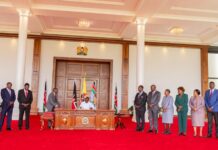A Kenyan scientist has been recognised for his efforts to save the world’s most endangered antelope at this year’s Animal Action Awards.
Dr. Abdullahi Ali, Founder of the Hirola Conservation Program (HCP), has been awarded the Lifetime Achievement Award by the International Fund for Animal Welfare (IFAW) at the BAFTA in London.
Dr. Ali has dedicated his life solely to the conservation of the hirola antelope, whose population is about 500 individuals, making it one of the most critically endangered mammals on earth.
He founded the Hirola Conservation Program in 2014 and has performed ground-breaking work to save the critically endangered antelope. His leadership, which combines evidence-based conservation, climate mitigation, habitat restoration, and community action, has made him a global voice for community-led conservation.
“Individual animals surviving and thriving keep us motivated despite the challenges we encounter. In 2012, we placed GPS tags on 12 hirolas in a very insecure and volatile area. This exercise contributed foundational research on hirola ecology, including species habitat requirements and diet. It also helped us to understand that range degradation is the primary contributor to the decline of the species. Replanting grasses that the antelope feed on has been pivotal in keeping the species alive,” says Dr. Ali.
Garissa is historical range for the hirola.
“Climate change is a major challenge in north-eastern Kenya – it’s either drought or floods. There are a lot of humanitarian efforts, but unfortunately, there is very limited support for wildlife. That is where we come in, to rescue and feed impacted animals or those seeking refuge in people’s homes during floods – including crocodiles. We work with the Kenya Wildlife Service to get the wildlife and release them back into their habitat,” he says.
Acquiring resources to care for the hirola is not easy, as donors tend to fund well-known charismatic species like elephants and lions.
Another challenge in hirola conservation is that when grasses are re-established to restore the rangeland, primarily found in community lands, existing traditional grazing plans are altered and, in some instances, the local communities tend to increase their livestock numbers. This is a problem because hirola and cattle eat the same food.
Despite these challenges, Dr. Ali has made significant strides in animal welfare and conservation in north-eastern Kenya.
“I congratulate Dr. Ali on winning the lifetime achievement award. What Dr Ali has accomplished takes resilience and discipline. This win should create much-needed global awareness of the little-known and highly endangered hirola antelope and help mobilise much-needed resources to do more not just for the antelope but for wildlife species in North Kenya in general,” said James Isiche, Africa Director, IFAW.



















